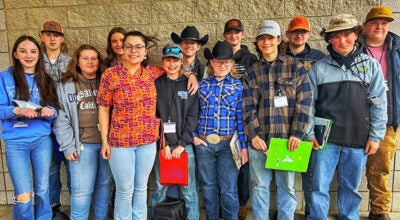Six projects approved by board
Published 1:45 pm Tuesday, May 21, 2019
This article has been modified from its original version to include the clarifications that ran in the Friday, May 31 edition of The Herald.
The Cumberland County Board of Supervisors voted to approve all six of the projects that had public hearings during its May 14 meeting. The votes, however, didn’t come without some discussion between members of the board and county administration.
It was a near-split vote of the board, with three voting to approve revised ordinances for the county setbacks and road frontages. The ordinance came with the amendment to reduce road frontages on primary and regular primary roads to 200 feet, rather than the 300 feet on primary roads and 350 feet on regular public roads initially proposed. The revised policies would reduce setbacks on primary roads from 130 feet to 100 feet.
There was also discussion about the county’s policies on height requirements for buildings, now allowing for dwellings to reach 60 feet in addition to public buildings.
Planning & Zoning Administrator J.P. Duncan, referencing a concern from District Three Supervisor Kevin Ingle about whether firefighters could access 60-foot buildings with their ladders, said there was the option to leave that part of the ordinance as it was originally written.
Ingle said he appreciated the research of the planning commission about this change, and said that with how most buildings are structured, it would not be difficult for firefighters to reach 60 feet.
District Five Supervisor Parker Wheeler asked what the frontage requirement would be for residential areas of Route 45. Duncan said it’s currently 500 feet but would be reduced to 300 feet.
Ingle brought up the possibility of reducing the frontage lots to 200 feet. He said he owns a 2-acre property that would not conform to the requirements for a public or private road.
“I think what we have done is limited the amount of housing on private or on public roads because of the great distance of 350 feet,” Ingle said. “300 feet is better. Why not go to 200 (feet)?”
Wheeler expressed concern about the close proximity driveways would be to one another, which he said would have the potential to create traffic congestion.
“I want everybody to be able to develop their land, but at the same time … a school bus would take three hours to get from 45 all of the way down to the Farmville town limits because it would have to stop at every single driveway,” Wheeler said.
Ingle made the motion to create the amendment reducing the road frontages to 200 feet, citing that the current road frontage may be serviceable for commercial entranceways or for residents who live in subdivisions, but may be limiting for other landowners.
“Let’s go ahead and let people use their land,” Ingle said. “I respect the idea of trying to keep space in between driveways, keep good visibility down on the highways … I just think that we are not letting our children build here.”
No members of the public spoke during the hearing.
Ingle, District Two Supervisor Lloyd Banks and Chairman and District Four Supervisor David Meinhard voted to approve the ordinance. Wheeler and District One Supervisor William “Bill” Osl voted in opposition.
Members of the board voted to approve a conditional use permit for Route 606 Auto, an auto mechanic shop that would be located at Blenheim Road.
Osl asked about the definition of inoperable vehicles in the second condition of the permit. He asked if inoperable vehicles were in the process of being repaired, or if the vehicles are no longer in use and would be stored at the garage for parts.
The condition stated that no more than 15 inoperable vehicles could sit outside the garage at any time.
Planning & Zoning Administrator J.P. Duncan said that inoperable vehicles would be vehicles that would be gathered for a junkyard. He said operable vehicles being repaired would not fall under the more than 15. Duncan said the junk cars could also be used for parts. Once the valuable parts were removed, Duncan said the remainder of the vehicles could be hauled away or recycled.
“Inoperable motor vehicle means any motor vehicle which is not in operating condition; or which for a period of 60 days or longer has been partially or totally dissembled by the removal of tires and wheels, the engine, or other essential parts required for operation of the vehicle or on which there are displayed neither valid license plates nor a valid inspection decal,” the condition cited.
The motion to approve the conditional use permit was unanimous.
No one spoke during the public hearing.
There were four speakers during the public hearing for the renewal of the Barn at Timber Creek conditional use permit, located at Holman Mill Road.
The permit remains similar to the one that was first approved by the board, but has an amendment to allow up to four events a year in which 300 or more people are allowed without requiring an event permit.
Robert Lipscomb, who owns the business with Whitney Lipscomb, said the venue was open to nonprofits and hadn’t caused any traffic concerns.
Wheeler expressed concern about the width of the entranceway into the venue, and whether cars had adequate room to pass one another. He asked if a study could be conducted. He asked that the motion be tabled until the next month.
Barbara Speas and Bill Bruce spoke during the hearing, taking similar positions that the venue was an important feature of the county, asked that the decision not be tabled, and that similar consideration of the impact to traffic was arguably not taken when the Green Ridge landfill was approved, which would require garbage trucks to enter the landfill on Route 60, a two-lane highway.
Carolyn Banton spoke during the meeting, asking that the board take consideration of the easement that belongs to them on Holman Mill Road and not approve the amendment. The easement agreement between the Bantons and the Thompsons stipulated that no more than 150 people would be allowed to visit the event facility. The conditional use permit by the Cumberland County Board of Supervisors that was approved prior to the permit approved on May 14 stipulates that up to 300 people could attend events.
Robert said that the Bantons were approached about having the Lipscombs purchase the easement. Carolyn said that did not take place. Carolyn said to the Herald after the public hearing had ended that they were approached about having their entire property bought, but not the easement specifically. This debate is set to be discussed in a future report by The Herald.
The entrance to the Barn at Timber Creek usually only sees one-way traffic due to motorists entering or leaving the venue at the same time. Robert said the business has a permit with the Virginia Department of Transportation (VDOT).
A substitute motion was made to approve the conditional use permit. Osl, Banks, Ingle and Meinhard voted in favor of the motion. Wheeler voted in opposition.
A public hearing was also set to approve a conditional use permit for Northfield Plantation at Old Buckingham Road, in which Whitney had also applied for the permit. Northfield Plantation would be an event venue.
There was a request to amend the permit to change the entranceway to Northfield Drive rather than Route 60, Anderson Highway.
“That makes much more sense as far as controlling traffic,” Ingle said.
Speas was signed up to speak, but she deferred. Osl, Banks, Ingle and Meinhard voted in favor of the motion and Wheeler abstained.
Members of the board voted unanimously to approve a rezoning permit for Hamilton Dance Studio, which would be located at the north side of Anderson Highway near the intersection of Oak and Forest roads. The property would be rezoned from Residential-2 to Business-1. The location would have the potential for the location to be expanded to include a convenience store and a restaurant. No one from the public spoke during the hearing.
There was also a rezoning permit for Price is Right Mini Storage facility at Raines Tavern Road to bring the location back into compliance by rezoning 4 out of approximately 25 acres of land from Agricultural-2 to Business-3.
Wheeler expressed concern about the motion, asking whether it could be considered spot zoning.
Duncan said while he believed the rezoning would solely make the property come into compliance, he wasn’t certain and would defer to County Attorney and Administrator Vivian Seay Giles.
Giles said it was not considered spot zoning.
No members of the public spoke during the hearing. The vote to approve the rezoning permit was unanimous.








